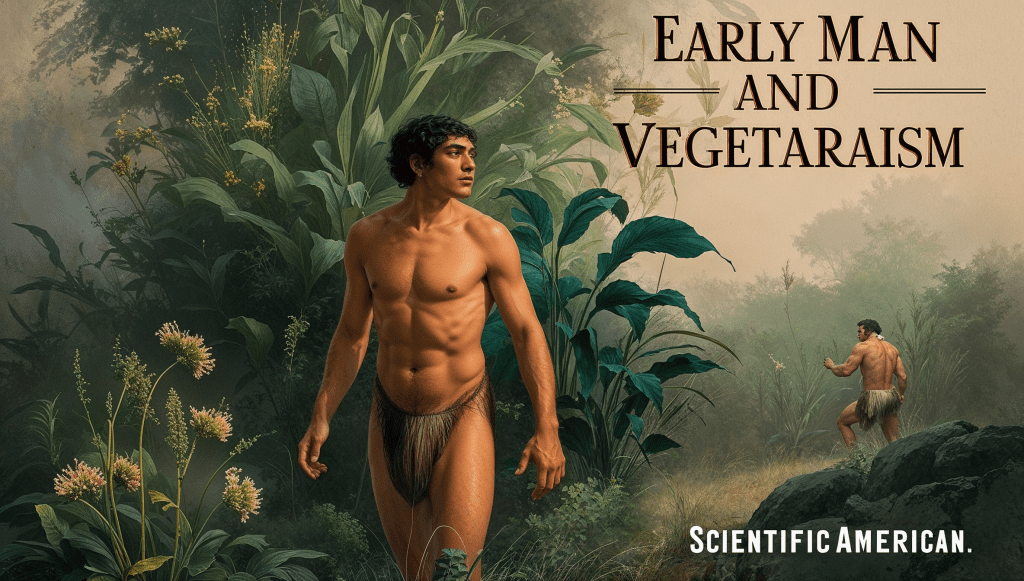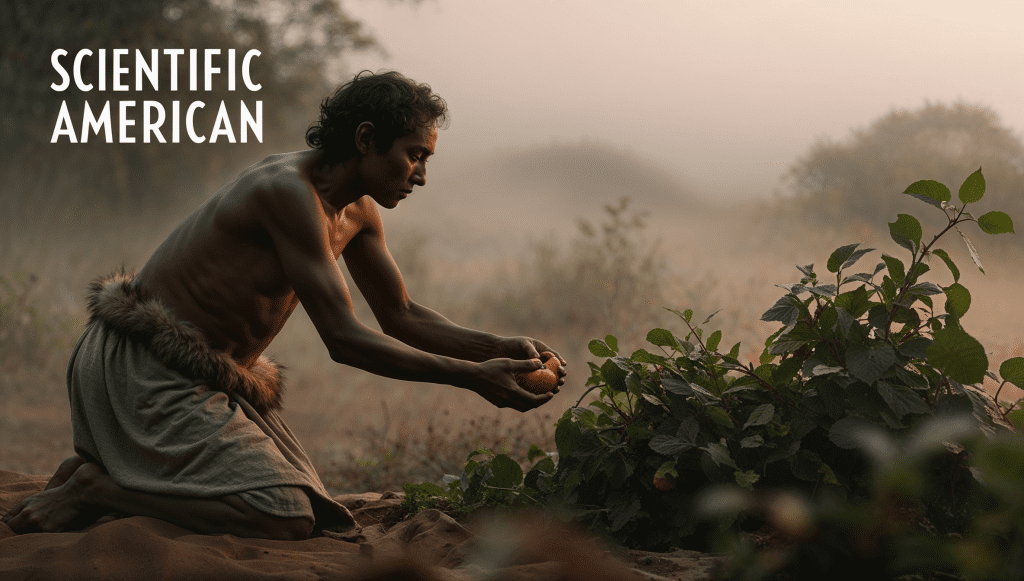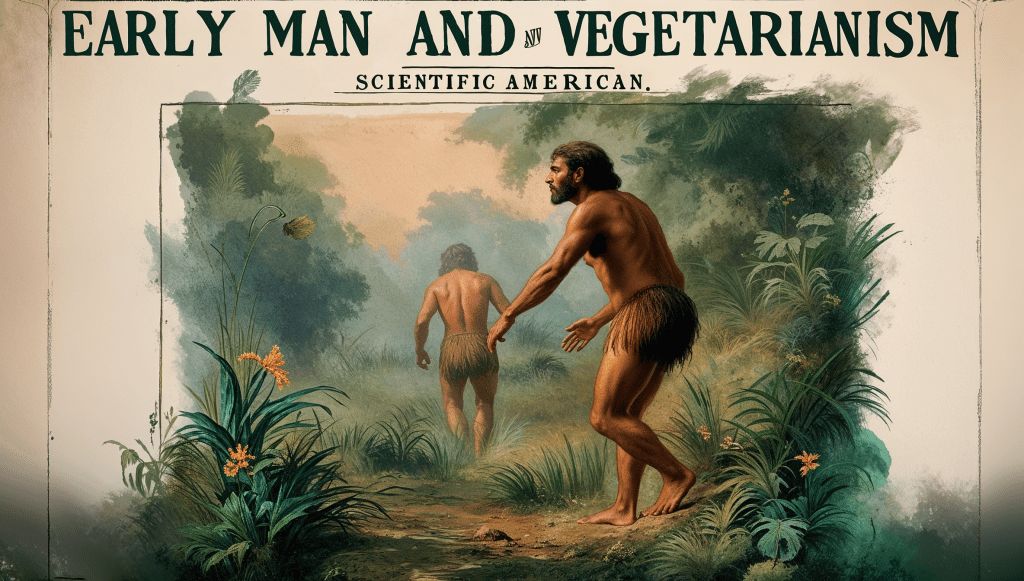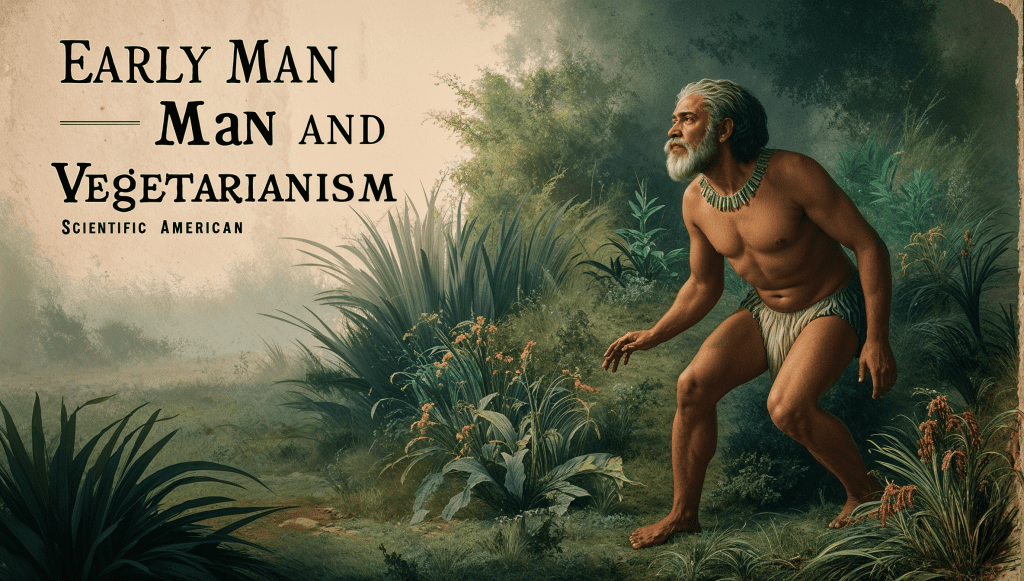Scientific American: Early Man and Vegetarianism
The dietary habits of early humans have long fascinated researchers, challenging our understanding of what it means to be human. Recent studies have begun to paint a more nuanced picture of our ancestors’ diets, suggesting that many early humans may have been predominantly vegetarian, particularly in certain regions. This article explores the implications of these findings and their relevance to contemporary discussions about diet and ethics.
Rethinking Early Human Diets
For decades, the narrative surrounding early human diets has been dominated by the belief that our ancestors were primarily carnivorous. This view suggested that a meat-rich diet was essential for fueling the development of our brains, providing the necessary protein for growth and cognitive function. However, recent groundbreaking research challenges this long-held assumption, revealing a more nuanced understanding of early human nutrition.
The Surprising Role of Plants in Our Ancestry
For decades, the narrative surrounding early human diets has been dominated by the belief that our ancestors were primarily carnivorous. This longstanding view suggested that a meat-rich diet was essential for fueling the development of our brains, providing the necessary protein for growth and cognitive function. However, recent groundbreaking research is challenging this assumption, revealing a more nuanced and complex understanding of early human nutrition.
The Conventional Wisdom
The traditional perspective has often painted a picture of early humans as relentless hunters, relying heavily on meat to survive. This notion was largely supported by findings of stone tools and animal bones at archaeological sites, which seemed to indicate a diet focused on hunting and meat consumption. Such a view contributed to the popular belief that as our ancestors transitioned from foraging to more organized hunting practices, their diets became increasingly carnivorous, ultimately leading to the development of larger brains and more complex societies.
New Insights from Archaeology
Recent discoveries, particularly from archaeological sites in the Andes Mountains, have prompted researchers to rethink this narrative. For example, studies led by archaeologists such as Randy Haas have analyzed the diets of prehistoric populations through isotopic analysis of human remains. These studies reveal a surprising reliance on plant-based foods, with some ancient communities consuming a diet consisting of up to 80% plant matter and only 20% meat.
Such findings highlight the significant role of various plant foods, particularly tubers like potatoes and other root vegetables, in sustaining early human populations. The abundance of these plants in their environment may have provided the necessary calories and nutrients that supported their health and development.
A More Balanced Diet
This research suggests that early humans were not strictly carnivorous but rather exhibited a more balanced diet characterized by a diverse range of foods. The term “gatherer-hunters” is becoming increasingly relevant, as it acknowledges the importance of foraging for fruits, nuts, and vegetables alongside hunting. This perspective emphasizes the adaptability of early humans and their ability to thrive in different environments by utilizing the resources available to them.
Implications for Human Evolution

The implications of these findings are profound. They suggest that the cognitive advancements that led to the development of complex societies may not have solely been driven by meat consumption. Instead, a diet rich in plant-based foods could have played an equally vital role in supporting brain development and overall health. The nutrients found in plants, such as fiber, vitamins, and minerals, are essential for cognitive function and could have contributed significantly to our ancestors’ mental and physical well-being.
Lessons for Modern Diets
The reevaluation of early human diets provides valuable insights for modern dietary practices. As contemporary society grapples with health issues related to excessive meat consumption, including heart disease and obesity, there is a growing movement towards plant-based diets. Embracing the lessons learned from our ancestors can encourage a more balanced approach to nutrition, emphasizing the importance of fruits, vegetables, whole grains, and legumes.
Incorporating more plant-based foods into our diets not only aligns with what we now understand about early human nutrition but also supports sustainable practices that benefit our planet. As we face the challenges of climate change and environmental degradation, learning from the dietary habits of our ancestors can guide us toward healthier, more sustainable food choices.
New Discoveries from the Andes
A pivotal study led by archaeologist Randy Haas from the University of Wyoming has emerged from archaeological sites in the Andes Mountains of Peru, painting a different picture of prehistoric diets. Through detailed isotopic analysis of human remains from burial sites, researchers found that some ancient populations relied heavily on plant-based foods, with evidence suggesting that their diets consisted of approximately 80% plant matter and only 20% meat.
This striking revelation invites us to reconsider the role of plants in early human diets. The research highlights the significance of tubers, such as potatoes, which were abundant in the region and formed a staple part of these communities’ diets. This reliance on plant foods challenges the long-standing notion that meat was the cornerstone of early human nutrition.
Gatherer-Hunters: A New Classification
The findings from Haas’s study suggest that these ancient peoples were better classified as “gatherer-hunters” rather than strictly hunter-gatherers. This terminology shift emphasizes the importance of foraging for plant-based foods over hunting activities. The evidence reveals that these communities were adept at utilizing their local environment, thriving on a diverse array of plant resources, which underscores their adaptability and knowledge of the land.
Implications for Understanding Human Evolution
These insights have profound implications for our understanding of human evolution and dietary practices. The prevailing assumption that early humans required a predominantly meat-based diet to support their brain development now appears overly simplistic. Instead, it may be that a rich variety of plant-based foods played a crucial role in fostering the cognitive advancements of our species.
Furthermore, this research challenges the modern dichotomy of plant-based versus animal-based diets. By recognizing that our ancestors thrived on a largely plant-centric diet, we can reevaluate our contemporary food choices and the potential benefits of incorporating more plant-based options into our diets.
Lessons from the Past
The implications of this research extend beyond mere historical understanding; they resonate with modern dietary practices and environmental considerations. As we face the challenges of sustainability and health in today’s world, learning from the dietary habits of early humans may offer valuable lessons. By embracing a more plant-forward approach, we can work toward healthier lifestyles while minimizing our ecological footprint.
As we continue to uncover the complexities of early human diets, it becomes increasingly clear that the relationship between our ancestors and their food was intricate and multifaceted. The traditional narrative of carnivorous early humans is evolving, revealing a rich tapestry of foraging, gathering, and plant-based nutrition that laid the foundation for human survival and development.
The Nutritional Value of Plants

As we delve into the diets of early humans, a fascinating narrative emerges that challenges the long-held belief in a primarily meat-based diet. While meat undoubtedly played a role in the nutritional landscape of our ancestors, recent scientific findings highlight the remarkable benefits of plant-based foods, revealing their crucial contributions to cognitive development and overall health.
Plant Power: A Source of Glucose and Cognitive Fuel
One of the most significant insights from archaeological and nutritional research is the role of glucose, derived from plant foods, as a vital energy source for the brain. According to a study published in the journal Nature in 2017, glucose is the brain’s preferred fuel, and its availability can significantly influence cognitive function. This finding underscores the importance of plant-based diets in early human nutrition.
Research indicates that early humans consumed a diverse array of plant foods, including fruits, vegetables, nuts, and seeds, which would have provided not only glucose but also a range of phytonutrients beneficial for brain health. For instance, the consumption of leafy greens and colorful fruits is linked to improved cognitive function, thanks to their high antioxidant content. A study from Frontiers in Nutrition found that diets rich in antioxidants, often found in plant foods, can help combat oxidative stress in the brain, potentially reducing the risk of neurodegenerative diseases.
Nutrient Density: Vitamins, Minerals, and Fiber

While meat is often lauded for its protein and fat content, plants offer a wealth of essential nutrients that contribute to a balanced diet. Studies show that a varied plant-based diet provides vitamins such as vitamin C, folate, and vitamin K, as well as essential minerals like potassium, magnesium, and calcium.
For example, a meta-analysis published in The American Journal of Clinical Nutrition found that individuals consuming a diet rich in fruits and vegetables had lower risks of chronic diseases, including heart disease and certain cancers. This protective effect can be attributed to the high levels of fiber, which is abundant in plant foods and plays a crucial role in digestive health. Fiber helps regulate blood sugar levels, promotes satiety, and supports a healthy gut microbiome.
A Historical Perspective on Plant Consumption
The nutritional advantages of plants extend back to our earliest ancestors, who thrived on diets that were largely plant-based. A study led by archaeologist Dr. Amanda M. P. Smith at the University of Connecticut analyzed ancient food residues and found evidence of significant plant consumption among prehistoric populations. The findings indicated that some communities relied on starchy tubers and grains as staple foods long before the advent of agriculture.
Moreover, research published in Current Anthropology suggests that the transition to farming was not solely driven by the need for animal protein but also by the desire to cultivate and consume nutrient-dense crops. This historical context reinforces the idea that plants have always played a vital role in human nutrition and health.
Modern Implications: Rethinking Dietary Choices

As contemporary society grapples with health issues linked to excessive meat consumption and processed foods, revisiting the dietary patterns of our ancestors can offer valuable insights into sustainable nutrition. A growing body of research indicates that plant-based diets are associated with numerous health benefits, including weight management, improved cardiovascular health, and a lower risk of chronic diseases.
For instance, a 2019 study published in JAMA Internal Medicine found that individuals who adopted plant-based diets had a significantly reduced risk of developing heart disease compared to those who consumed higher amounts of red and processed meats. This aligns with the World Health Organization’s recommendations to reduce meat consumption for better health outcomes.
Embracing Plant-Based Nutrition for Future Generations
The implications of understanding the nutritional value of plants extend beyond personal health; they also impact environmental sustainability. Plant-based diets require fewer resources—land, water, and energy—compared to meat-heavy diets, making them a more sustainable choice for the planet.
As we embrace the lessons from our ancestors, we can foster a greater appreciation for the diverse and nutrient-rich offerings of the plant kingdom. By prioritizing plant-based foods in our diets, we can not only improve our health but also contribute to a more sustainable and compassionate food system.
Ethical Considerations and Modern Implications
The dietary habits of early humans provide valuable insights into the ethical questions surrounding our current food choices. In a world dominated by factory farming and industrial agriculture, many individuals are reevaluating their diets, reflecting on the implications of animal welfare and environmental sustainability. As we learn more about how our ancestors thrived on predominantly plant-based diets, it invites a critical examination of what it means to eat ethically in today’s context.
Reevaluating Food Choices
As modern consumers become increasingly aware of the detrimental effects of industrial farming practices—such as animal confinement, inhumane treatment, and the environmental degradation caused by monoculture—there is a growing movement toward more sustainable and ethical eating practices. This shift is not merely a trend; it represents a significant cultural awakening where individuals are considering the impact of their food choices on animals, the environment, and their health.
Research indicates that many early human populations thrived on diets rich in fruits, vegetables, nuts, and seeds. This evidence encourages contemporary eaters to explore the potential of plant-based diets as a means to nourish both the body and the planet. For those choosing vegetarianism or veganism, these historical insights bolster the notion that humans can indeed flourish on plant-based diets without sacrificing nutrition or health.
Health and Nutritional Benefits
The growing body of scientific research supports vegetarian and vegan diets, highlighting their numerous health benefits. Studies have shown that individuals adhering to plant-based diets tend to have lower risks of chronic illnesses such as heart disease, diabetes, and certain cancers. Moreover, these diets are often associated with improved weight management and better digestive health, reinforcing the idea that a plant-centric approach can be both nutritious and beneficial for long-term well-being.
Environmental Sustainability
Beyond personal health, the implications of our food choices extend to environmental sustainability. The livestock industry is one of the leading contributors to greenhouse gas emissions, deforestation, and water pollution. By choosing plant-based options, individuals can significantly reduce their ecological footprint. This shift not only supports healthier ecosystems but also promotes biodiversity, as diverse plant-based farming practices can restore balance to our agricultural systems.
Cultural Reflections and Evolution
The narrative surrounding early human diets is not just about what our ancestors ate; it reflects the profound complexity of our relationship with food. Understanding the choices made by early humans reveals how these decisions were deeply intertwined with their environments, available resources, and cultural practices. As we explore this historical context, we recognize that our current dietary habits are shaped by a blend of cultural, social, and economic factors, often prioritizing convenience over ethics.
The Connection Between Environment and Diet

Early humans lived in diverse environments, from lush forests to arid deserts, which significantly influenced their dietary choices. Research indicates that early hunter-gatherer societies were incredibly adaptable, relying on a wide range of food sources available in their habitats. For example, studies of prehistoric diets have uncovered evidence of varied consumption patterns, with some groups thriving on predominantly plant-based diets while others relied more heavily on animal products.
One fascinating example comes from the analysis of ancient remains found in the Arctic regions, where communities primarily consumed fish and marine mammals. In contrast, groups in the Mediterranean areas included more grains, fruits, and vegetables. This adaptability highlights how environmental conditions shaped not only the survival of early humans but also their cultural practices and food preferences.
Cultural and Social Influences on Diet
Food choices are inherently cultural. In many societies, certain foods are imbued with symbolic meaning, and eating practices are often tied to social rituals, religious beliefs, and communal gatherings. For example, in many Indigenous cultures, the consumption of traditional foods is a way to honor ancestral practices and maintain a connection to the land.
Scientific studies show that these cultural practices have deep roots in the way communities have interacted with their environments. A 2018 study published in Nature found that early agricultural societies developed specific dietary preferences based on the crops that thrived in their regions, which in turn influenced social structures and cultural identities. As societies evolved, so too did their relationship with food, often moving toward more convenient, processed options that reflected economic shifts and urbanization.
Ethics and the Modern Food System
In today’s fast-paced world, convenience often trumps ethical considerations in our dietary choices. Industrial agriculture, factory farming, and global supply chains have transformed the way food is produced and consumed, leading to disconnection from the sources of our meals. Many people are unaware of the environmental and ethical implications of their food choices, which can contribute to a myriad of issues, including climate change, animal welfare concerns, and public health crises.
By reflecting on the dietary practices of our ancestors, we can gain insights into fostering a more compassionate food system. Research suggests that diets rich in plant-based foods not only benefit individual health but also have a lower environmental impact. According to a 2019 study in Science, transitioning to a more plant-centric diet could reduce greenhouse gas emissions by up to 70%, underscoring the importance of dietary choices in addressing climate change.
Learning from the Past: A Path Forward

Embracing the insights gained from studying early human diets can help us cultivate a deeper understanding of our own food practices. The quest for a more compassionate food system, one that reflects the choices of early humans thriving on plant-based diets, is increasingly relevant in our contemporary world.
This shift requires a collective re-evaluation of our relationship with food—one that honors tradition while adapting to modern realities. As more people seek to incorporate sustainable practices into their diets, such as local sourcing, seasonal eating, and plant-based cooking, we can create a food culture that prioritizes health, ethics, and environmental stewardship.
The legacy of early human diets serves as a powerful reminder of the intricate connections between food, culture, and the environment. By understanding our past, we can inspire future generations to make informed and compassionate choices, ultimately leading to a healthier planet and society.












